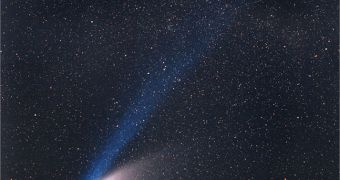About 18 years ago, a ground-breaking computer study revealed that Jupiter, the largest planet in our solar system, plays an important role in protecting Earth from comets in the solar system. When the study was recently revisited, astronomers found that the issue is considerably more complex.
Apparently, the gas giant is both Earth's friend and enemy. The past investigation primarily focused on the former, but only because of the limited technological means astronomers had available at the time.
Slower computers meant that late astronomer George Wetherill and his group had to make a number of simplifications and approximations, which invariably led them to the conclusion that Jupiter was protecting Earth from Oort Cloud comets, by knocking them off their course.
Given its massive gravitational pull, the planet would have no problem forcing any comet, or even a planet, to exit the solar system, and disappear in deep space. Since 1994, it was believed that Jupiter is always watching out for our safety.
Wetherill's “was a ground-breaking study but at the same time it was one that was limited by what he had available,” says astronomer Jonathan Horner, who led the new study. He holds an appointment at the University of New South Wales, in Sydney, Australia.
He conducted the work with Barrie Jones, an expert at the Open University, in the United Kingdom. This is where the new computer simulations were carried out as well, Space reports.
The team agreed that Jupiter indeed plays a protective role in ensuring we don't get hit by long-period comets, but scientists were unsure as to how the planet would act on short-period comets and near-Earth objects (NEO).
Details of their research were published in a series of papers appearing in the latest issue of the International Journal of Astrobiology. The studies show that Jupiter is in fact throwing objects from the Inner Asteroid Belt (IAB), a massive conglomeration of space rocks beyond the orbit of Mars.
“The main thing that is driving material from the Asteroid Belt into the inner solar system is the influence of something called a secular resonance. As things stand now in our solar system, this particular secular resonance is right at the inner edge of the asteroid belt,” Horner explains.
The role that Jupiter plays in the way comets travel through the solar system has yet to be fully understood, so astronomers will most likely keep at it for quite some time.

 14 DAY TRIAL //
14 DAY TRIAL //